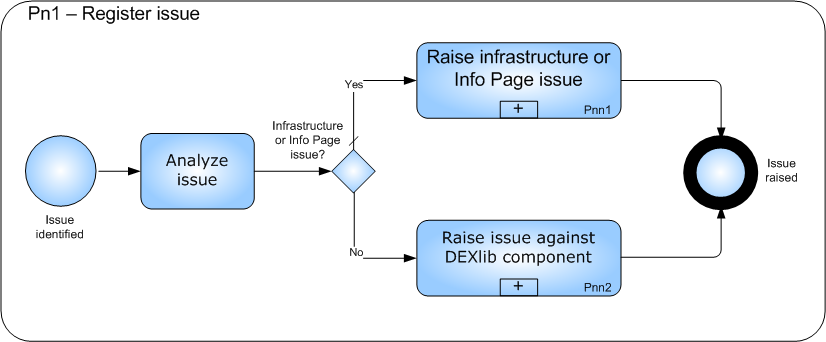 issues log
issues log
| Help TOC > Managing issues | |
| Managing issues |
A DEXlib "issue" is an objection to something that exists within DEXlib. This could be either be against something that has been developed within DEXlib, e.g. a DEX, a Capability, a Templates or a Reference Data class, or against the infrastructure it self.
Issue logs are used to provide a visibility and traceability to issues raised and resolved. There are a number of different issue logs in DEXlib;
 issues log
issues log
The 'Main issues log' contains issues against things that cannot be referred to a specific DEX, Capability, Template or Reference Data class, and which affects all or most of them. This could for instance be the use of colours in figures, or how the scope statement in the different DEXs differs in the way they are expressed.
The log is displayed by choosing 'Tools' in the top navigation bar, and then selecting 'Main issues' under 'Issue logs' in the left hand side index.
The path to the log file is; dexlib/docs/issues/main_issues.xml
Issues against DEXs, Capabilities and Templates are recorded in individual logs for each specific DEX, Capability or Template.
These logs can be viewed independently by navigating to the component of interest, and then clicking on 'Issues' in the navigation menu. How to navigate in DEXlib is described in the Navigation instructions section
A collection of all existing issues against developed DEXs, Capabilities (and Templates) is displayed by choosing 'Tools' in the top navigation bar, and then selecting 'All issues' under 'Issue logs' in the left hand side index.
One unique issues log is associated with each DEX, Capability or Template. The log is
stored in:
dexlib/data/[ID]/dvlp/issues.xml,
where [ID] is the identifier of the DEX, Capability or Template,
which also is identical to the name of the directory where it is kept.
Issues against Reference Data classes and Ontologies are recorded in the 'Reference Data issues log'.
The log is displayed by choosing 'Reference Data' in the top navigation bar, and then selecting 'RDL issues' in the left hand side index.
The path to the log file is;
dexlib/data/refdata/dvlp/issues.xml
During the development of DEXs, Capabilities and Templates, sometimes problems are detected that concern the underlying STEP AP239 standard. Such issues are recorded in the 'AP239 issues log' and in relevant cases, raised as a SEDS (SC4 Enhancement and Discrepancy System) to ISO TC184-SC4. Read more about SEDS in the Raising SEDS chapter of the Info Pages.
The log is displayed by choosing 'Tools' in the top navigation bar, and then selecting 'AP239 issues' under 'Issue logs' in the left hand side index.
The 'Infrastructure issues log' contains issues against things regarding the functionality of DEXlib and other related resources. This could for instance be a request for a possibility view of all DEXs with their scope statements on one single page in DEXlib, or a notification of an XSL stylesheet not producing the desired output. The infrastructure log also records issues, both about content and functionality, for the PLCS Information Pages within DEXlib.
The log is managed with Bugzilla software.
Info on Bugzilla can be found in the
Bugzilla
chapter in the Info Pages.
The path to the old and obsolete log file is;
dexlib/docs/issues/infrastructure_issues.xml
Issues identified during DEX development within the OASIS PLCS TC are managed in two different ways depending on their type as descibed in figure 1.

Issues against components being developed or used during DEX development, i.e. DEXs, Capabilities, Templates, Reference Data, Ontologies and AP239 modules, are managed within DEXlib using XML files. This is described in the following sections in this page (chapter).
Issues against the functionality of DEXlib and other related resources, and about content and functionality for the PLCS Information Pages within DEXlib, are managed with the Bugzilla software. Information about Bugzilla and how it is used by the OASIS PLCS TC is described in the Bugzilla subchapter of the Software chapter.
If the identification and resolution of an issue results in a general change regarding how work is carried out, fuctionality in the DEXlib infrastructure, the constitution of existing or new DEX components and equal matters, this should always be documented in the PLCS Help and Information Pages as a part of the issue resolution process. The PLCS comunity should also be informed through the appropriate exploder list (not yet described by the process model in the figure).
This section describes how to raise an issue against a Capability.
An issue against a DEX, Reference Data or the DEXlib infrastructure is raised much in the same way.
An issue should be raised if you find something that you disagree with or think is a fault in a Capability. You should not edit a Capability without the permission of the project leader. You need to have permissions as a modeller in order to be able to create a new issue. If you are not a modeler, explain the problem to someone who is and let them help you.
The following steps explains how to raise an issue in DEXlib.
<!-- +++++++++++++++++++++++ --> <issue id="" type="general" category="minor_technical" by="" date="" status="open"> <description> </description> </issue>
Each issue has the following form:
<issue
id=""
class=""
class_file="plcs-rdl.owl"
status="open"
category="minor_technical"
by=""
date="04-07-19"
seds="no"
ballot_comment="no"
resolution="accept">
<description>
</description>
<issue>
Where:
When an issue is addressed, a comment should be added. The form of the comment is:
<comment by="" date=""> <description> ... </description> </comment>
Where:
There are basically two types of comments, one that discusses the description of the issue, and one that describes a solution and closes the issue.
The following steps explains how to reslolve an issue.
<issue ... >
<description> ... (original description) ... </description>
<comment
by=""
date="">
<description> ... </description>
</comment>
</issue>